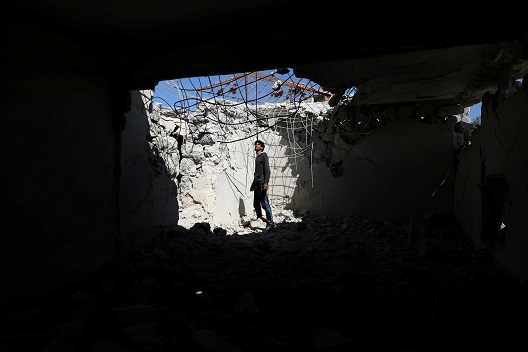 Max Boot in the Post argues that letting Syrian President Bashar al-Assad “win as quickly as possible” is “the way to save lives.” But the United States is not obstructing Mr. Assad’s military progress. Mr. Boot is pushing on a door that lacks even a hinge.
Max Boot in the Post argues that letting Syrian President Bashar al-Assad “win as quickly as possible” is “the way to save lives.” But the United States is not obstructing Mr. Assad’s military progress. Mr. Boot is pushing on a door that lacks even a hinge.
Bashar al-Assad is indeed winning. Beyond outnumbered, outgunned Syrian rebels, no one stands in his way. The way he is winning, however, mandates an American response beyond talk. The terror bombing of 400,000 residents of Eastern Ghouta is but the latest episode of a multi-year campaign of mass civilian homicide.
Over nearly seven years the humanitarian price for Syrians has been exorbitant, and the geopolitical costs for the West have been prohibitive. After witnessing the Obama administration’s chemical weapons ‘red line’ climb-down in 2013, Russia’s Vladimir Putin moved against Crimea and assaulted the American electoral system with absolute impunity. Then as now, Assad thinks he can slaughter civilians when and where he wishes, so long as he refrains from using certain kinds of chemicals.
Mr. Boot acknowledges that Assad’s assaults on civilian residential areas are war crimes. Boot suggests, “We can try to bargain with Moscow to restrain Assad’s brutality in return for an end to US opposition to his regime, and we can maintain the taboo against the use of weapons of mass destruction.”
Would a Washington endorsement of Assad’s incumbency, coupled with operational indifference to mass homicide, stop the merciless bombardments of hospitals, schools, marketplaces, mosques and apartment buildings? This is the nature of Syrian-Russian war-making; the essence of Assad’s modus operandi. An American blessing of Bashar would, for Putin and Assad alike, elicit smiles of smug satisfaction. It would not, however, end the collective punishment of civilians living in rebel-controlled areas.
Might the US sweeten the offer by ending its aid to those rebels? But wait: that was already done, in 2017. Surely something of value was gotten in return from the Russians. Surely it was not a unilateral concession. Surely the safety of Syrian children and their parents weighed on American officials at the time, and the proper assurances secured.
And yes, maintaining the “taboo against the use of weapons of mass destruction” is important for the US. It is important for Assad as well. As addicted as he is to chemical weaponry, there is one assurance on which he can rely: if he avoids using the really bad stuff, he can target defenseless civilians with everything else at his disposal. He can do so without fear of an American reaction beyond angry speeches at the United Nations.
If the taboo has one practical use, it is this: if Assad decides to use sarin gas now, as he did in April 2017, the American military response would likely be instant. No, there would not be aerial dogfights with Russians in the skies above Damascus. But, as was the case nearly a year ago, when President Trump ordered cruise missile strikes in the wake of a regime chemical atrocity, the use of sarin now would presumably prompt a similar operation to neutralize some of Assad’s weapons of mass terror: aircraft, artillery, rockets, and the like.
As the regime creates Syria’s Guernica in Eastern Ghouta, the administration has the option of warning the Russians to knock it off and then, if necessary, strike regime targets already identified and assessed for the contingency of sarin use.
Would American missile strikes end a civilian-centric campaign of mass homicide? Not very likely. Could they slow it? It did so for a while last year. Would it pull the plug on an inadvertent, but deadly American green light for non-chemical mass murder? It certainly would.
Claiming that exacting a price for civilian homicide only makes things worse for the victims is not a new argument; as anyone familiar with Western reactions to twentieth century episodes of genocide, and other forms of mass murder, will testify. One may acknowledge the emptiness of Western proclamations of “Never Again,” while still acknowledging that mass homicide in Syria—aside from the humanitarian consequences—helps Islamist extremists recruit globally, hurts American allies and friends in the region and Western Europe, and teaches a very dangerous lesson to other dictators about the feasibility of mass murder as a survival technique.
Max Boot knows all of this and has written passionately and effectively about it. If he believes that letting Assad win is the ultimate answer, fine. He can rest assured there is nothing in the current policy of the US government standing in the way of that outcome. But the ongoing slaughter of civilians will not be stopped by verbal endorsements of Assad’s continued rule. And the consequences for us and our allies of permitting and unintentionally encouraging a cost-free ride to mass murder will be no prettier in the future than they have been to date.
Frederic C. Hof is director of the Atlantic Council’s Rafik Hariri Center for the Middle East.
Image: Photo: A man inspects a damaged house in Busra al-Harir town, near Deraa, Syria March 13, 2018. REUTERS/Alaa al-Faqir
